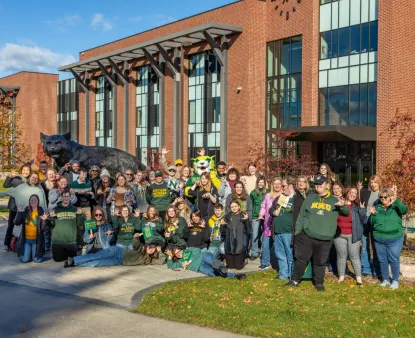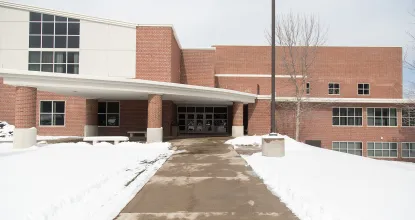
First Generation College Students
If your parent(s) or legal guardian(s) have not completed a bachelor’s degree, then you are considered a first generation college student. On average, about 35% of NMU students are first generation college students.
Congratulations on being a First Generation college student – this is a wonderful accomplishment. You have shown determination, persistence and resourcefulness to get to college; these traits will help you be successful at NMU as well. As a first generation student, we know that you will have unique experiences during your time at NMU. Some of these experiences will be challenging and/or intimidating.
When a group of first generation college students at NMU was asked about the advice they'd give to first generation students, they had five tips:
- Ask lots of questions. Don’t be afraid to put yourself out there.
- Never assume you’re alone or that you can’t get help.
- It’s okay to get frustrated. Don’t let your frustrations get in the way of being successful.
- Find people and resources that you connect with.
- Get comfortable with advocating for yourself and expressing your needs and concerns.
You might be wondering what college will be like or who to ask for help. Please take some time to view the resources NMU has to offer students like you. We look forward to supporting you in your educational experience and connecting you with other first generation students as well as NMU faculty and staff who understand your unique needs.
If you are not sure where to go or what question to ask, stop in the Dean of Students Office located in Hedgcock. Let us know that you have questions as a First Generation student and we can meet with you right away or set up an appointment to talk. We're here to help connect you with the campus resources and point you in the right direction.
ASSIST Program
ASSIST is a program funded by Northern Michigan University with the mission of increasing the retention and graduation rates of First-Generation, low-income students, and students with disabilities, through a core mentorship with a dedicated advisor. ASSIST is committed to providing a broad base of high-quality services by engaging students in an individualized learning environment within a continuous improvement process.
If you are a first generation college student, where neither parent has earned a baccalaureate degree, you may qualify for acceptance into the ASSIST program. Each participant accepted into the program works with an advisor to develop an individualized plan of support. This plan includes goals a student would like to achieve during the academic year and what the ASSIST program can do to support them in achieving their desired goals. Services that participants often use include:
- Academic and personal advising
- Exploration of academic majors and related careers
- Assistance with understanding the financial aid process
- Exploration of graduate school
- Free printing services
- Access to skill-building workshops
- Referral and advocacy within the NMU and Marquette communities
We firmly believe First Generation students have the ability to excel at NMU. Students accepted into the ASSIST program develop excellent academic credentials. In the past five years:
- Annually, on average, 70% of participants maintained a 3.0 GPA or higher
- Each semester 36% have earned Dean’s List Honors
- Several ASSIST participants have been named top graduating seniors in their academic departments
The ASSIST program serves as a supportive ‘home base’ for many First Generation students who continue their involvement with the program until completion of their baccalaureate degree.
McNair Scholars Program
The mission of the McNair Program at NMU is to increase post-baccalaureate success among underrepresented students. We are dedicated to supporting students in their pursuit of critical inquiry through research experiences and to fostering productive relationships between students and faculty researchers. The McNair Scholars program also seeks to encourage students to embrace diversity and cultivate lifelong learning goals through cultural activities and individual academic support.
The McNair program works with students who are sophomores, and have a cumulative GPA of at least 2.75. Other eligibility requirements include first-generation and low-income status. If neither of your parents have earned a bachelor’s degree and you come from a low-income family, you may be eligible for the McNair Program. You may also be eligible if you are a member of an underrepresented minority group.
The McNair Program affords its participants many benefits, including:
- Faculty guided research internship with stipend and housing allowance.
- Funding for travel to regional and national conferences.
- Funding for travel to visit graduate school programs.
- Group seminars covering a range of topics related to research and graduate school preparation.
- One-on-one academic advising to guide you through the process of exploring and applying to graduate school.
- Referral and advocacy within the NMU community.
Graduates of the McNair Program have gone on to great things, including enrollment at prestigious universities, including:
- University of Michigan - Ann Arbor (Medical School, Biopsychology, Cell Biology, etc.)
- California State University – North Ridge (STEM Cell research)
- Georgia State University
- University of Tennessee
- Michigan State University – (Veterinary school, Medical School, etc.)
- Columbia University
Applications for this prestigious program open in the fall of each year. The McNair Program works with only 28 students per year, so participants get lots of individual attention. For more information send an email to mcnair@nmu.edu or stop by our offices in 2807 West Science.
First Wildcats
First Wildcats is the first generation student organization on campus. The purpose of First Wildcats is to build and strengthen connections between first generation college students and other NMU students, faculty, staff and campus resources. On average, about 35% of NMU students are the first in their family to attend college. As a first generation student you can be a part of the First Wildcats organization and we invite you to become involved with us during your time here at Northern. Find a support system of other students going through the same things as you, learn more about how to succeed at Northern, and make lifelong connections.
Membership is open to any student who is a first generation college student or who would like to connect with first generation students. For more information contact us at dso@nmu.edu.
First Gen Services
Get connected with First Generation Services
- Getting Connected Outside of the Classroom
- Balancing Academics and Social Life
- Financial Literacy and FAFSA
- Make a Difference Day - volunteer opportunities
- Selecting your Classes for Fall- tips for meeting with your Academic Adviser
- Preparing for Summer
- Time Management
- February Volunteer Opportunities
- Applying for Summer Employment
- Staying engaged with NMU During Summer
- Finals Prep and Stuff Swap
Personal Librarian Services
Do you have any of these questions?
How do I find a book, website, or article on my topic?
How do I get a copy of something that our library doesn’t have?
What can I use other than Google to find information on my topic?
Can the library provide me with stuff to read for fun? Or movies?
How do I use the library’s databases? What if I’m not on campus?
What kinds of equipment are available at the library to check out?
What kinds of computing services are available in the library?
How do I print in the library?
How do I reserve a study room in the library?
I need help with citations in my papers.
Don't sweat them! Come find Bruce Sarjeant for assistance in the Olson Library, Harden 224, back near the Map Collection. All librarians are available to help you, but Bruce works directly with the First Generation program to keep students on the right track. Connect with him to discuss your assignment.
Students do best when they have support from families and friends. There are some unique challenges your student may go through and we have provided some resources for help.
Transitioning to College
- Choosing a major and deciding what to do after college.
- Balancing work and school.
- Paying for college.
- Finding where to go with questions and what questions to ask.
- Adjusting to the college culture – learning about resources on campus, the ‘language of college life,’ and what’s expected of them in and out of the classroom
Here are some ideas of things you can do to help your student be more successful at NMU:
- Learn about NMU:
- Attend parent orientation while your student attends student orientation. Learn about campus resources so you can connect your student with people who can help them.
- Check out the parent website for important dates and reminders - http://www.nmu.edu/parents
- Sign up for the parent partnership newsletter - http://www.nmu.edu/parentpartnership/node/
- Talk with your student about college:
- Share your expectations
- How often do you plan to talk to each other?
- Do you expect your student to come home over breaks?
- How much money do you expect your student to spend?
- Share your expectations
- Understand there will be changes:
- Remember that your student’s ability to dedicate time to family may not be as much as before.
- Recognize the pressures of attending college – there is an increased responsibility for students in college – internships, study time, professors’ expectations outside of class, getting involved on campus.
- Be patient with each other – your family is learning about a new culture. It’s a big transition for everyone.
- General Tips:
- Remind your student to keep track of who they talk to, what the outcomes are and make copies of important documents and/or save emails.
- Ask your student what their goals are while attending NMU so you can better support them in reaching their goals.
- Visit NMU and have your student show you the places and people that are important to them.
- Call us if you have questions or are concerned about your student.
